Drawing beautiful pomegranates / (ENG/ESP)


Saludos amigos y revivan todos una grata bienvenida a mi publicación.
Hoy les presentó un nuevo dibujo que he creado con colores escolares, el dibujo de hoy se trata de un fruto llamado granada, según algunas investigaciones que he realizado, se dice que este árbol de granados se cultivó desde hace aproximadamente unos 5 mil años, su fruto conocido como la granada fue muy importante en la antigüedad por los egipcios, babilonios, romanos.
Este fruto se le conoce como afrodisiaco, y según la inspiración de la corona de los reyes se hizo por su peculiar cáliz con forma de corona, el cual fue la inspiración de los judíos para hacer dichas coronas.
Para mí personalmente en mi casa, tengo un árbol de granados, es una de mis plantas favoritas que tengo en mi jardín, me encanta su fruto por sus propiedades medicinales, aparte de que su fruto es hermoso y decorativo, actualmente me han solicitado mucho el fruto para tratar problemas de toroides, manifestando excelente resultados, entre una de sus propiedades medicinales, les estoy mencionando una de ellas.
Al final de la publicación les estaré mencionando los materiales que utilice para poder crear este hermoso dibujo.
Las fotografías que verán a continuación, fueron tomadas con mi teléfono modelo Alcatel_5044R.
A continuación, les presentaré el proceso de elaboración que implemente para realizar este dibujo.

Greetings friends and relive all a pleasant welcome to my publication.
Today I present a new drawing that I have created with school colors, today's drawing is about a fruit called pomegranate, according to some research I have done, it is said that this pomegranate tree was cultivated since about 5 thousand years ago, its fruit known as the pomegranate was very important in ancient times by the Egyptians, Babylonians, Romans.
This fruit is known as an aphrodisiac, and according to the inspiration of the crown of kings was made by its peculiar crown-shaped chalice, which was the inspiration of the Jews to make such crowns.
For me personally in my house, I have a pomegranate tree, it is one of my favorite plants that I have in my garden, I love its fruit for its medicinal properties, besides its fruit is beautiful and decorative, currently I have been requested a lot the fruit to treat problems of toroids, showing excellent results, among one of its medicinal properties, I am mentioning one of them.
At the end of the publication I will be mentioning the materials I used to create this beautiful drawing.
The pictures you will see below were taken with my Alcatel_5044R model phone.
Next, I will show you the elaboration process that I implemented to make this drawing.



Paso 1
Para empezar a realizar este dibujo, comencé a dibujar el tallo, luego lo adapté a los frutos que están sujetos en él, uno al lado del otro.
Para realizar las granadas, dibuje dos circunferencias deformes debido a que estas tienen algunos bultos sobresalientes que la hacen ser no siempre circules perfectos.
Luego de hacer las circunferencias, deje algunos espacios sin líneas donde dibuje el cáliz, dicho cáliz tiene forma de corona como había mencionado en el párrafo anterior.

Step 1
To start making this drawing, I began by drawing the stem, then I adapted it to the fruits that are attached to it, one next to the other.
To make the pomegranates, I drew two deformed circles because they have some protruding bumps that make them not always perfect circles.
After making the circles, leave some spaces without lines where I draw the calyx, this calyx has the shape of a crown as I mentioned in the previous paragraph.




PASO 2
Al terminar con el paso anterior, comencé a dibujar las hojas, flores y algunos otros complementos del dibujo.
Pueden notar que una de las granadas tiene un orificio donde se pueden apreciar las semillas de la granada, las cuales son semillas cargadas de un néctar o un jugo con un sabor muy agradable.
También simule como muestra en la imagen de referencia, algunas semillas caídas, así como hojas y una flor, esto hace que el dibujo se note más interesante y bello, de hecho en la imagen de referencia sale un ave, la misma no quise dibujar para atraer más la atención de este fruto que últimamente está siendo muy conocido y utilizado para infinidades de decoraciones y para el consumo de muchos por sus diversas propiedades y usos.
Culminando el dibujo, comencé agregarle los primeros tonos de colores, comenzando por la parte superior del tallo, remarcando con el color marrón todas sus ramas.

STEP 2
After finishing with the previous step, I started to draw the leaves, flowers and some other complements of the drawing.
You can notice that one of the pomegranates has a hole where you can appreciate the seeds of the pomegranate, which are seeds loaded with a nectar or juice with a very pleasant flavor.
I also simulated as shown in the reference image, some fallen seeds, as well as leaves and a flower, this makes the drawing more interesting and beautiful, in fact in the reference image there is a bird, which I did not want to draw to attract more attention to this fruit that lately is being well known and used for countless decorations and for the consumption of many for its various properties and uses.
Once the drawing was finished, I began to add the first shades of color, starting with the upper part of the stem, highlighting all its branches with brown.


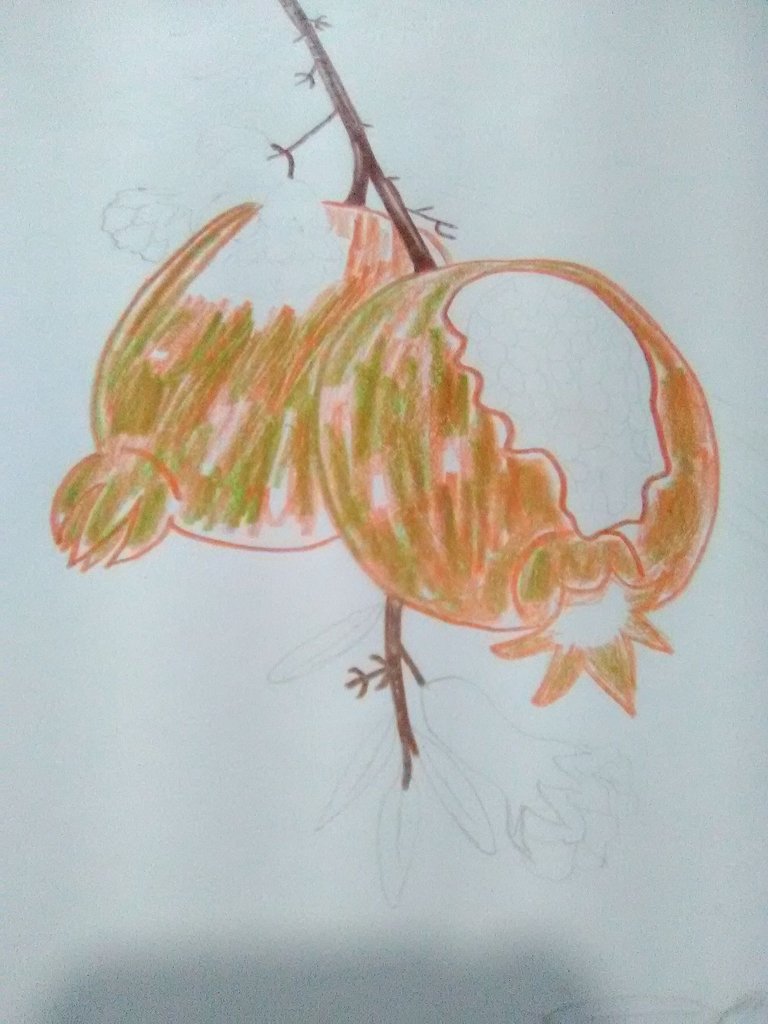

PASO 3
Luego comencé agregarle las tonalidades al fruto de granada, las cuales estos tonos que le agregue son los siguientes: como primera capa de color utilice el color verde amarillo en colores Kores, sobre este agregue el color anaranjado claro.
Por encima de estas dos capas mencionadas, agregue el color rojo, dejando algunos espacios para hacer unos efectos de brillo y luz con el color blanco.

STEP 3
Then I started adding the shades to the pomegranate fruit, which are the following: as the first layer of color I used the yellow green color in Kores colors, on top of this I added the light orange color.
On top of these two layers, add the red color, leaving some spaces to make some brightness and light effects with the white color.




PASO 4
Culminando con la parte externa de la granada, coloreé el tallo y hojas.
Para colorear las hojas, aplique algunas líneas de color marrón en el centro de la hoja para darle más profundidad al tono de color, para fusionar la mezcla de colores, también para colorear las hojas usé dos tonos de verde, una verde amarillo en las puntas y un verde mucho más fuerte en el resto de la hoja.

STEP 4
Culminating with the external part of the pomegranate, I colored the stem and leaves.
To color the leaves, I applied some brown lines in the center of the leaf to give more depth to the color tone, to blend the color mix, also to color the leaves I used two shades of green, a yellow green on the tips and a much stronger green on the rest of the leaf.
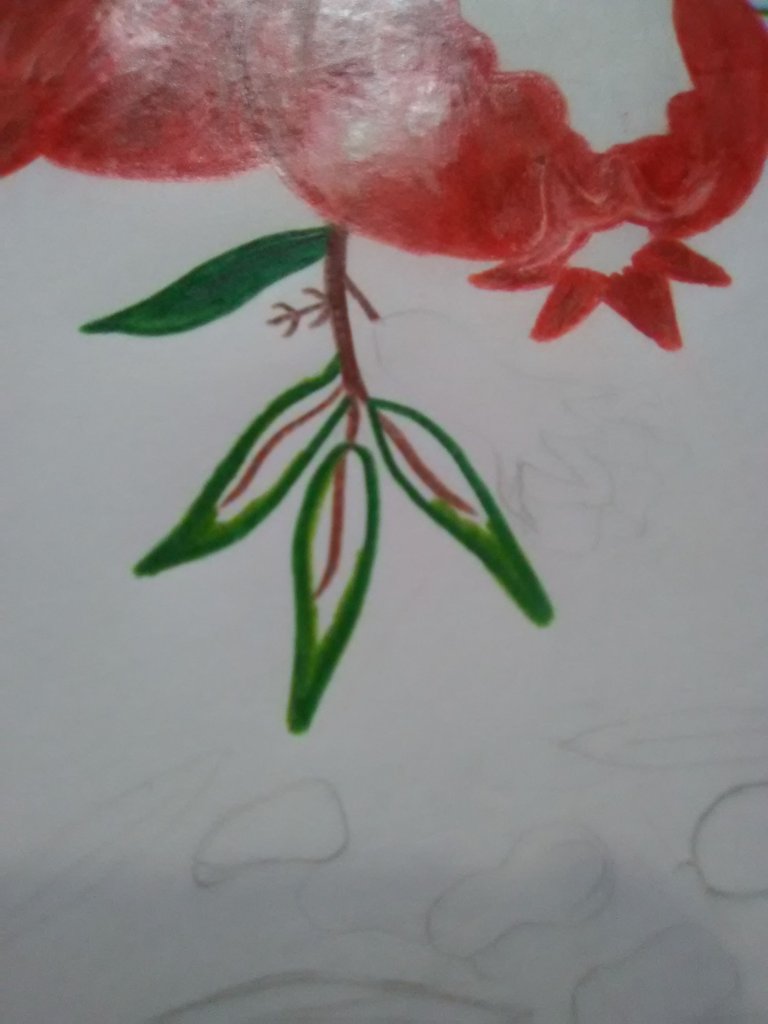



PASO 5
Después comencé a colorear las flores con los colores anaranjado, marrón, rojo, rosa pálida, blanco y amarillo tostado.
Primero remarque y rellene la flor con el color anaranjado, también utilice el marrón para hacer algunas profundidades y detalles de esta, en el centro de la flor lo deje para posterior agregarle el color amarillo tostado.
Después de tener la flor rellena con el color anaranjado, agregue sobre esta capa el color rojo para hacer el color naturalmente más parecido al color real de las flores de este árbol.
Para los pétalos de las flores, coloree con el color rosado más rosa pálida, rosado fuerte, algún tono de naranja y tono amarillo, luego mezcle todos estos colores.

STEP 5
Then I started to color the flowers with the colors orange, brown, red, pale pink, white and tan yellow.
First I highlighted and filled the flower with the orange color, I also used the brown to make some depths and details of it, in the center of the flower I left it to later add the toasted yellow color.
After having the flower filled with the orange color, add on this layer the red color to make the color naturally more similar to the real color of the flowers of this tree.
For the flower petals, color with pink plus pale pink, hot pink, some shade of orange and some shade of yellow, then mix all these colors together.
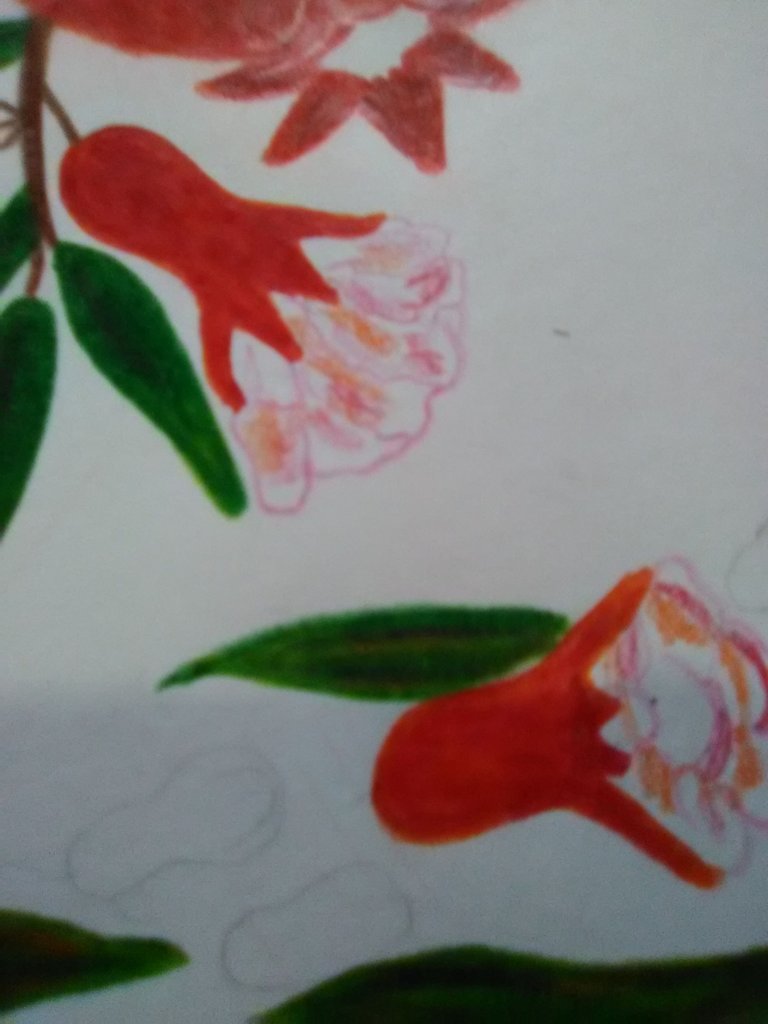

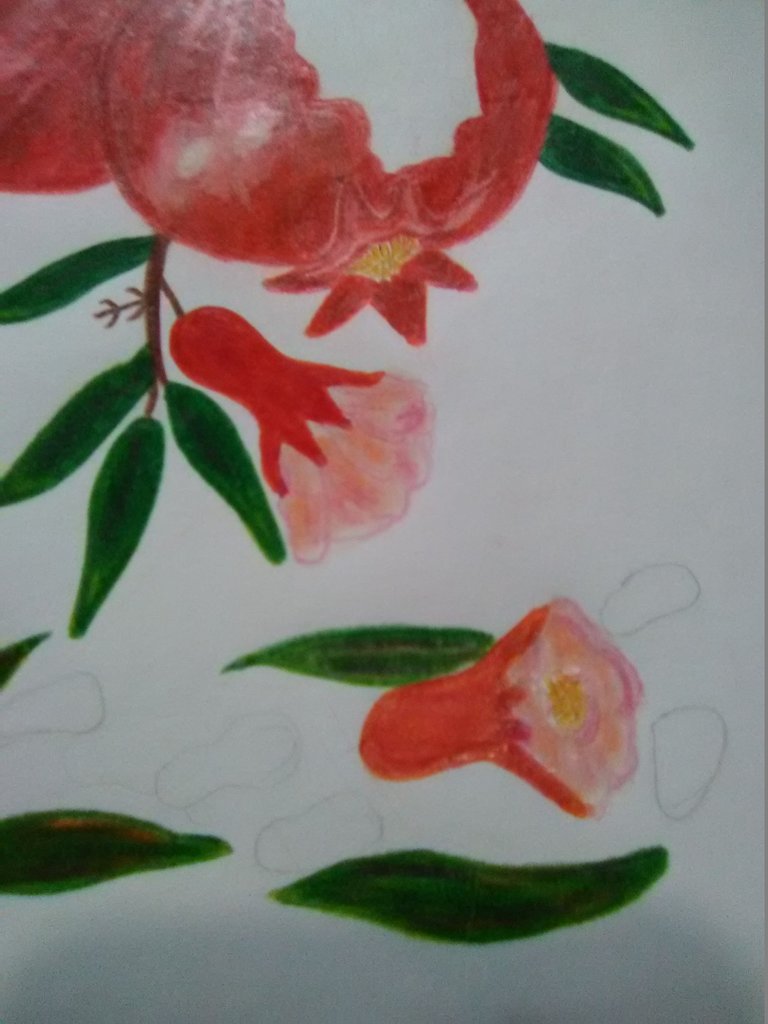

PASO 6
Sobre estas capas de color anteriormente mencionadas, selle todos los restos colores con el color blanco, dándome un resultado de una fusión de colores de las flores reales de este hermoso árbol.
Para el centro de la flor agregué un amarillo cromo con algunos puntos blancos, marrón y rojo para conseguir el tono deseado del centro del cáliz de la flor.
Después de haber terminado con el coloreado de las flores y el resto de hojas, comencé a colorear las semillas de la granada con los colores anaranjado, morado, rojo y unos reflejos blancos, coloreando esto en forma circular un color sobre el otro, como primer color el anaranjado, luego morado y sobre estos el rojo, dejando espacios en blanco para hacer los reflejos de brillo.
Finalmente, con el color blanco terminé de sellar el cojín donde están las semillas y hacer algunos efectos adicionales de brillo a este dibujo.
MATERIALES
BLOC DE DIBUJO.
BORRADOR.
SACAPUNTAS.
Lápiz de dibujo 2B.
PAÑO.
Colores como:
Verde amarillo.
Verde pino.
Blanco.
Marrón.
Morado.
Anaranjado.
Rojo.
Amarillo tostado.
Amarillo cromo.
La imagen que utilice en referencia posee su fuente, puesto que es una imagen sacada de Pinterest, de donde estoy sacando todas las imágenes que uso para realizar mis dibujos.
Así culmino mi publicación amigos, espero que te haya gustado y que hayas aprendido algo nuevo el día de hoy con esta publicación.
Nos veremos en otra publicación basada en el hermoso mundo del arte del dibujo.

STEP 6
On top of these layers of color mentioned above, I sealed all the remaining colors with the white color, giving me a result of a fusion of colors of the real flowers of this beautiful tree.
For the center of the flower I added a chrome yellow with some white, brown and red dots to get the desired tone of the center of the calyx of the flower.
After having finished with the coloring of the flowers and the rest of the leaves, I began to color the seeds of the pomegranate with orange, purple, red and some white reflections, coloring this in a circular way one color over the other, as first color the orange, then purple and over these the red, leaving white spaces to make the reflections of brightness.
Finally, with the white color I finished sealing the cushion where the seeds are and make some additional effects of brightness to this drawing.
MATERIALS.
DRAWING PAD.
Draf.
Pencil sharpener.
2B drawing pencil.
RAG.
Colors such as:
Yellow green.
Pine green.
White.
Brown.
Purple.
Orange.
Red.
Toasted yellow.
Chrome yellow.
The image I used in reference has its source, since it is an image taken from Pinterest, where I am getting all the images I use to make my drawings.
This is the end of my post friends, I hope you liked it and that you learned something new today with this post.
See you in another publication based on the beautiful world of the art of drawing.
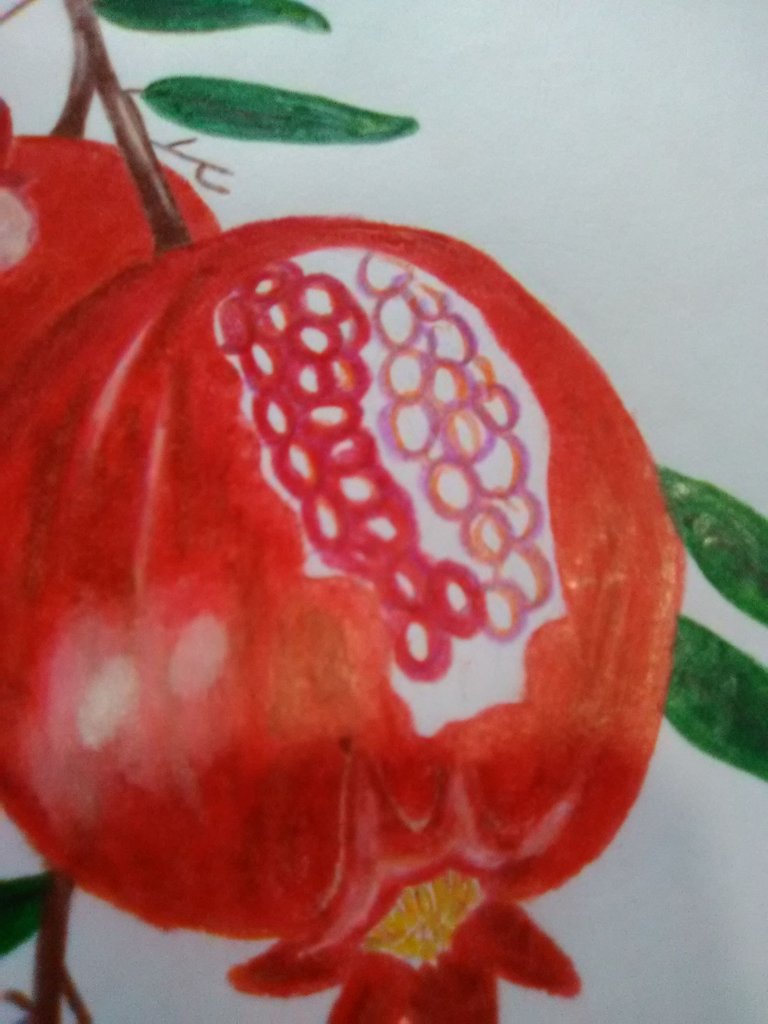
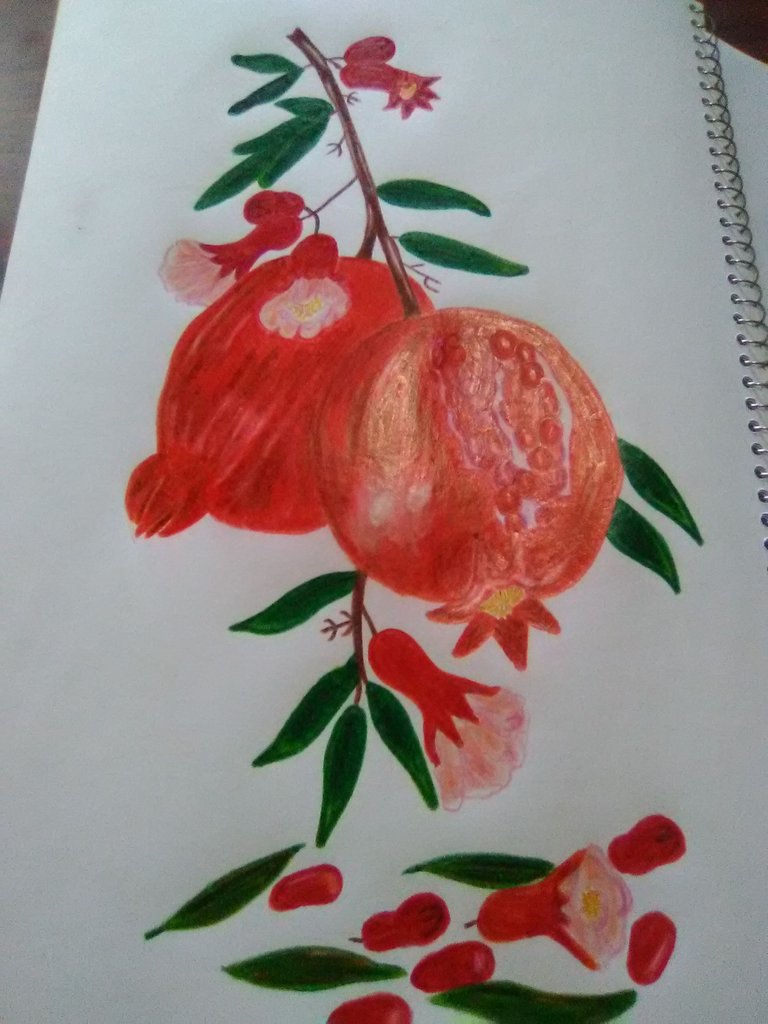
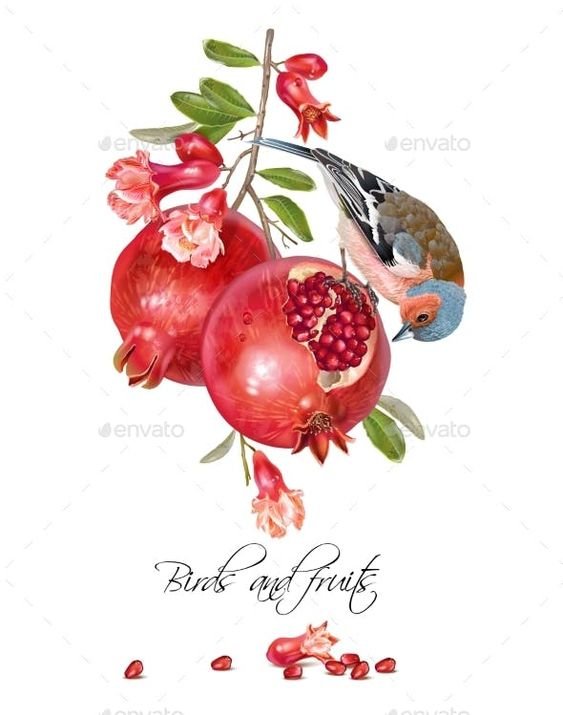
social networks / redes sociales
Traductor Deepl
Translated Deepl
Ediciones Canva
Editions Canva



Te quedo muy lindo el dibujo los colores todo esta genial.
Gracias, me alegro de que te allá gustado, saludos.
Holaaa amiga, no sabía la historia de esta fruta, te quedó genial el dibujo
Gracias, me alegro de que te haya gustado, saludos.